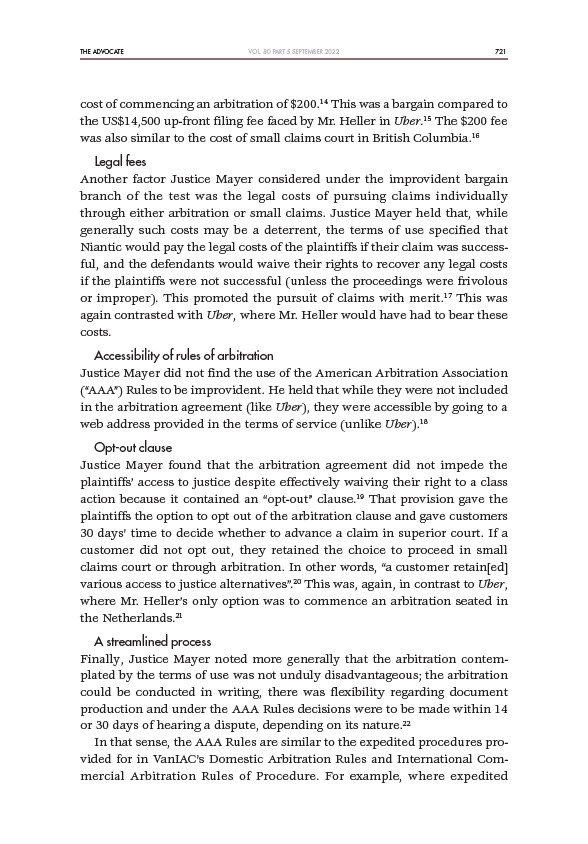
THE ADVOCATE 721
VOL. 80 PART 5 SEPTEMBER 2022
cost of commencing an arbitration of $200.14 This was a bargain compared to
the US$14,500 up-front filing fee faced by Mr. Heller in Uber.15 The $200 fee
was also similar to the cost of small claims court in British Columbia.16
Legal fees
Another factor Justice Mayer considered under the improvident bargain
branch of the test was the legal costs of pursuing claims individually
through either arbitration or small claims. Justice Mayer held that, while
generally such costs may be a deterrent, the terms of use specified that
Niantic would pay the legal costs of the plaintiffs if their claim was successful,
and the defendants would waive their rights to recover any legal costs
if the plaintiffs were not successful (unless the proceedings were frivolous
or improper). This promoted the pursuit of claims with merit.17 This was
again contrasted with Uber, where Mr. Heller would have had to bear these
costs.
Accessibility of rules of arbitration
Justice Mayer did not find the use of the American Arbitration Association
(“AAA”) Rules to be improvident. He held that while they were not included
in the arbitration agreement (like Uber), they were accessible by going to a
web address provided in the terms of service (unlike Uber).18
Opt-out clause
Justice Mayer found that the arbitration agreement did not impede the
plaintiffs’ access to justice despite effectively waiving their right to a class
action because it contained an “opt-out” clause.19 That provision gave the
plaintiffs the option to opt out of the arbitration clause and gave customers
30 days’ time to decide whether to advance a claim in superior court. If a
customer did not opt out, they retained the choice to proceed in small
claims court or through arbitration. In other words, “a customer retained
various access to justice alternatives”.20 This was, again, in contrast to Uber,
where Mr. Heller’s only option was to commence an arbitration seated in
the Netherlands.21
A streamlined process
Finally, Justice Mayer noted more generally that the arbitration contemplated
by the terms of use was not unduly disadvantageous; the arbitration
could be conducted in writing, there was flexibility regarding document
production and under the AAA Rules decisions were to be made within 14
or 30 days of hearing a dispute, depending on its nature.22
In that sense, the AAA Rules are similar to the expedited procedures provided
for in VanIAC’s Domestic Arbitration Rules and International Commercial
Arbitration Rules of Procedure. For example, where expedited